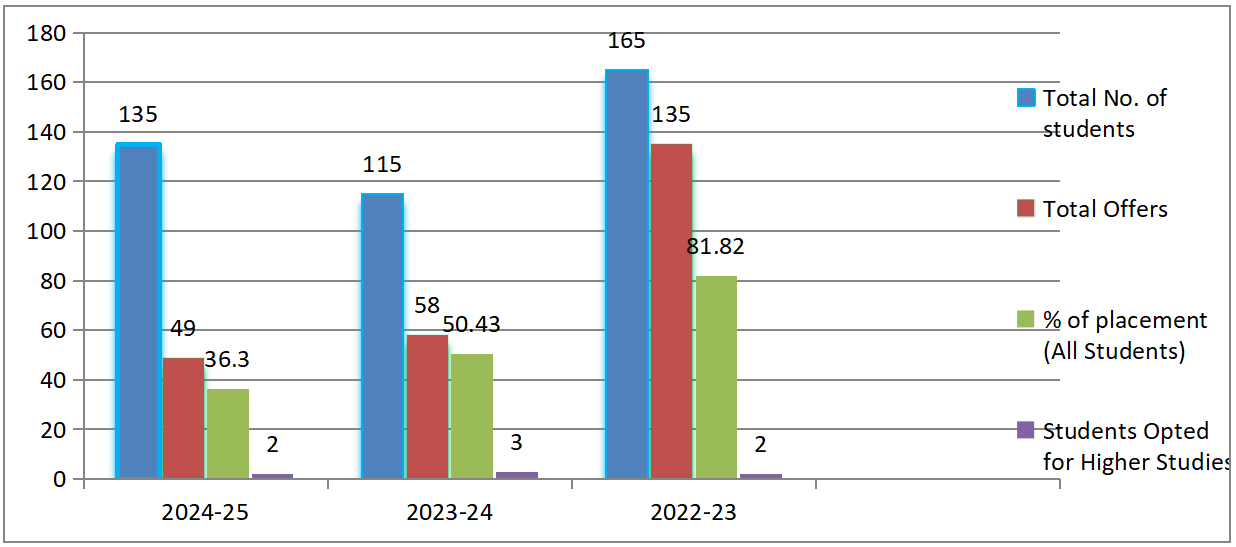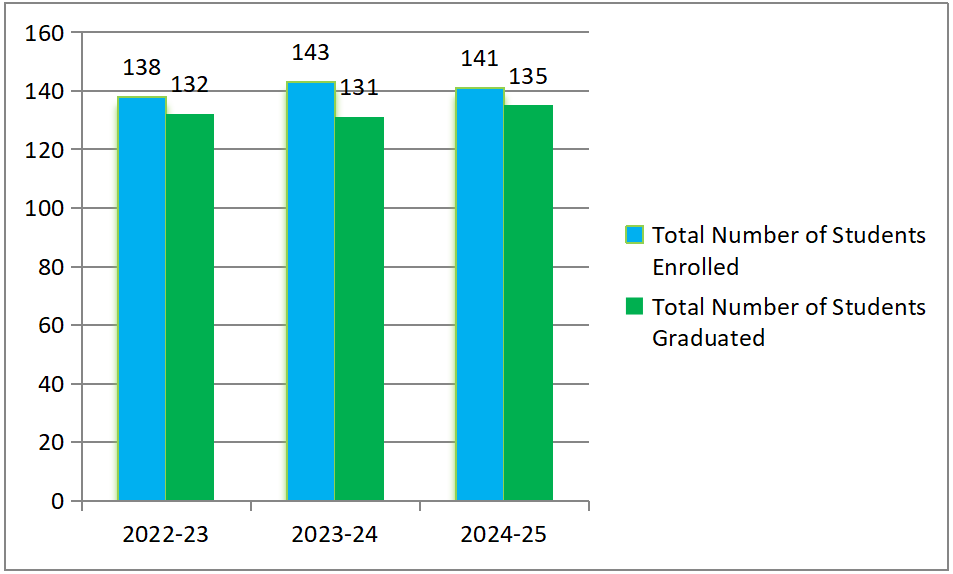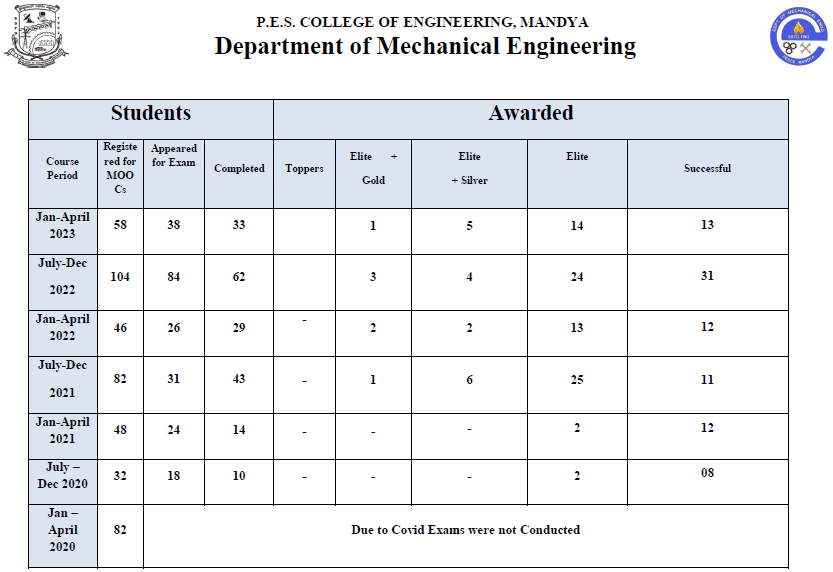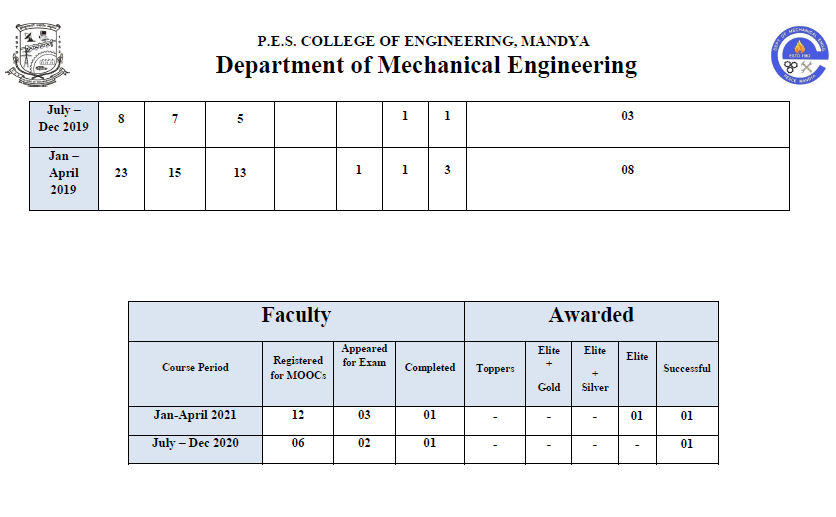Program Overview
The Mechanical Engineering Department has carved a niche for itself by offering the most competent instructional program to under graduate students leading to BE degree. Department is well equipped with dedicated faculty, department focus on research in the field of design and analysis of machine elements, composite material technology and vibration analysis and machine vision system.
The quality of teaching and training has yielded high growth rate of placement at various organizations. Large number of candidates pursuing research programs (M.Sc/Ph D) and department providing consultancy for research facility available in the department. Department is recognized as Research Centre by V T U and Mysore University offers part time and full time Ph.D. Programs.
Total Intake
120
Program Type
UG
Duration
4 Years
- About Course
- NBA
- Faculty
- Placement
- Research
- Result and Role of Honor
- Achievements
- Activities
- Alumni
- MOOCs
Vision
"Be a department well recognized for its ability to develop competent mechanical engineers capable of working in global environment"
Mission
- Provide quality education by competent faculty.
- Provide adequate infrastructure and learning ambience for the development of essential technical skills.
- Inculcate a sense of higher education and research orientation.
- Foster industry interaction.
Program Educational Objectives (PEOs)
Graduates of the program will be able to
- PEO1: Use the fundamentals of basic science, mathematics and mechanical engineering, to pursue their career as engineers as well as to lead and manage teams in global organizations.
- PEO2: Pursue advanced education, research and development and engage in the process of life-long learning.
- PEO3: Become entrepreneurs in a responsible, professional and ethical manner to serve the society.
Program Outcomes (POs)
Engineering Graduates will be able to
- PO1: Engineering Knowledge: Apply knowledge of mathematics, natural science, computing, engineering fundamentals and an engineering specialization as specified in WK1 to WK4 respectively to develop to the solution of complex engineering problems.
- PO2: Problem Analysis:Identify, formulate, review research literature and analyze complex engineering problems reaching substantiated conclusions with consideration for sustainable development. (WK1 to WK4)
- PO3: Design/Development of Solutions:Design creative solutions for complex engineering problems and design/develop systems/components/processes to meet identified needs with consideration for the public health and safety, whole-life cost, net zero carbon, culture, society and environment as required. (WK5)
- PO4:Conduct Investigations of Complex Problems:Conduct investigations of complex engineering problems using research-based knowledge including design of experiments, modelling, analysis & interpretation of data to provide valid conclusions. (WK8).
- PO5: Engineering Tool Usage:Create, select and apply appropriate techniques, resources and modern engineering & IT tools, including prediction and modelling recognizing their limitations to solve complex engineering problems. (WK2 and WK6)
- PO6: The Engineer and The World:Analyze and evaluate societal and environmental aspects while solving complex engineering problems for its impact on sustainability with reference to economy, health, safety, legal framework, culture and environment. (WK1, WK5, and WK7).
- PO7: Ethics:Apply ethical principles and commit to professional ethics, human values, diversity and inclusion; adhere to national & international laws. (WK9)
- PO8: Individual and Collaborative Team work:Function effectively as an individual, and as a member or leader in diverse/multi-disciplinary teams.
- PO9: Communication:Communicate effectively and inclusively within the engineering community and society at large, such as being able to comprehend and write effective reports and design documentation, make effective presentations considering cultural, language, and learning differences
- PO10: Project Management and Finance:Apply knowledge and understanding of engineering management principles and economic decision-making and apply these to one’s own work, as a member and leader in a team, and to manage projects and in multidisciplinary environments.
- PO11: Life-Long Learning:Recognize the need for, and have the preparation and ability for i) independent and life-long learning ii) adaptability to new and emerging technologies and iii) critical thinking in the broadest context of technological change. (WK8)
Program Specific Outcomes (PSOs)
The Under Graduate (UG) of B.E Computer Science & Engineering Program has defined Program Specific Outcomes (PSO) which are listed below.
- PSO1: Apply computer simulation and experimental methods in the design and development of sustainable products of mechanical systems..
- PSO2: Utilize the knowledge of advanced manufacturing and condition monitoring techniques in industrial applications.
Engineering Graduates will be able to ( P21 Scheme)
- PSO1: Apply conceptual knowledge with practical engagement that has real life problems by integrating different domains of mechanical engineering
- PSO2: Utilize the modern tools and emerging technologies with technical skills to design, develop and analyse mechanical systems through multidisciplinary approach.
| Program Name | Duration | Start | End |
|---|---|---|---|
| Mechanical Engineering | 3 Years | 2023 | 2026 |
| Mechanical Engineering | 3 Years | 2020 | 2023 |
| Mechanical Engineering | 3 Years | 2017 | 2020 |
| Name of Technical Staff | Designation | Qualification | Work Experience (Yrs.) |
|---|---|---|---|
| H.S. Chandra Shekar | Foreman | DME | 32 |
| B. Sathish Chandran | Instructor | (B.E) | 31 |
| Hanumantha Shetty | Instructor | DME | 30 |
| J. Ramesh | Asst. Instructor | DME | 14 |
| M.Y. Manjesh | Asst. Instructor | DME | 14 |
| K.Tharakeshwara | Asst. Instructor | DME | 12 |
| Devaraju | Asst. Instructor | DME | 12 |
| Madegowda H | Asst. Instructor | DME | 12 |
| Ravi B | Asst. Instructor | DME | 12 |
| A.M. Raju | Asst. Instructor | MA | 26 |
| H.S. Charan | Mechanic | ITI | 14 |
| C. Nagaraju | Mechanic | ITI | 14 |
| R.N. Mallesha | Mechanic | DME | 14 |
| Sharath S L | Mechanic | ITI | 05 |
| M. Shiva Kumar | Mechanic | SSLC | 21 |
| M.M. Mahesh | Helper | SSLC | 30 |
| K.Gopal Raju | Helper | SSLC | 21 |
| K.S. Kalyan Kumar | Helper | JOC | 21 |
| Kendiaihswamy | Helper | SSLC | 14 |
| S.S Varadharaju | Helper | PUC | 14 |
| H Parvathi | Helper | ITI | 09 |
| Nagesh S. J. | Helper | PUC | 09 |
| K.N. Armugam. | Helper | SSLC | 33 |
| M N Manjunatha | Helper | SSLC | 36 |
Academic Year 2022-23

| Name of the Research Guide | Phone Number | Email-Id |
|---|---|---|
| Dr. Ghanaraja S | +91 9449149167 | ghanaraja08@gmail.com |
| Dr. Rudreshi Addamani | +91 9739102611 | rudreshaddamani@gmail.com |
| Dr. K.J. Mahendra Babu | +91 9448754666 | babukjm1008@yahoo.com |
| Dr. S V Anil Kumar | +91 9448799499 | svanil999@gmail.com |
| Dr. Sadashiva M | + 91 9972212773 | sadashiva015@gmail.com |
| Dr. Gurupavan H.R | +91 9686632650 | gpavan1989@gmail.com |
| Dr. Rupesh S | + 91 9846048651 | mailtorupeshs@gmail.com |
| Dr. Madhusudana C K | +91 7338513801 | madhusudanack.008@gmail.com |
| Name | Guide Name | Title of Research | Date of Final Viva Completed |
|---|---|---|---|
| Mohammad Rafi H Keru | Dr. T. Nagaraju | 3D Surface Roughness on Steady State and Transient Non – Newtonian THD Analysis of Porous Bearing | July 2021 |
| Naveed Anjum | Dr S L Ajit Prasad | Processing and characterization of Particulate Filled and Natural Fiber Reinforced polymer composites | June 2020 Click here for more |
| Name | Guide Name | University/Research Center | Topic Status |
|---|---|---|---|
| Pavan Krishna K | Dr C J Gangadhara Gowda | PET Research Center | |
| C.M. Ramanuja | Dr.S Ghanaraja | PET Research Center | click here for more |
| Research Scholar | Title | Status | Details Link |
|---|---|---|---|
| M .R Devaraj | Analysis of Thermal effects & Mechanical Properties of Matrix Composites Reinforced with Carbon-Fibers and ceramic particles | Course work completed | |
| Mahesh B .S | Convective & radiation heat transfer through fins | Course work completed |
click here for more |
| Name | International / National Journal | International / National Conference | Total |
|---|---|---|---|
| Dr. S. Ghanaraja | 35 | 37 | 72 |
| Dr. Rudresh Addamani | 16 | 20 | 36 click here for more |
| Application Number | Application Date | Title | Faculty | Status |
|---|---|---|---|---|
| 216476 | 2003 | An Extrusion Honing Composition | Dr. H.P Raju | Granted |
| 1172/Del/2010 | 19/5/2010 | Processing of alumina Nano-Particle reinforced cast metal matrix composites |
Dr. S. Ghanaraja | Applied |
| 201841026027 | 2018 | Single wheeled self-balancing electric vehicle | Dr. C. J. Gangadhara Gowda and Mr Shreyas G.V(Student) |
Granted |
| 2021102713 | 20/05/2021 | Fully autonomous smart manufacturing unit using Intelligent Feature Recognition Algorithm |
Dr. Sadashiva M | Published |
| 202141032004 | 16/07/2021 | Online reinforced learning of assembly sequence planning with interactive guidance systems for indus |
Dr. Sadashiva M | Published |
| 202041050076 | 27/11/2020 | Intelligent Car Parking System Using IOT | Dr. Anil Kumar S V | Published |
| 202141043144 | 1/10/2021 | A Novel Rotary Flow Control Valve in Gas Turbine Fuel Inhjection Frame work |
Dr. K J Mahendra Babu | Published |
| 202141043279 | 5/11/2021 | With Solar Water Boiling System, Increase Thermoelectric Capacity |
Mr. Siddesh Kumar N M | Published |
| 202141043085 | 5/11/2021 | Construction of Cheap Verbalized Robotic Hand for Specific Adherence |
Mr. Ramesh Kurbet | Published |
| Year of Pass | 2022-23 | 2023-24 | 2024-25 |
|---|---|---|---|
| Total Number of Students Enrolled | 165 | 115 | 135 |
| Total Number of Students Graduated | 161 | 112 | 132 |

Academic Year 2023-24
| Name of Student | USN | CGPA | Rank |
|---|---|---|---|
| Dheeraj N U | 4PS19ME041 | 8.75 | First |
| Sushmitha S | 4PS19ME116 | 8.53 | Second |
| Mahesh M | 4PS20ME414 | 8.49 | Third |
Academic Year 2022-23
| Name of Student | USN | CGPA | Rank |
|---|---|---|---|
| Chandan N | 4PS18ME016 | 9.09 | First |
| Santhosh R | 4PS18ME077 | 9.01 | Second |
| Darshan N | 4PS18ME022 | 8.95 | Third |

Dr. B. N. Suresh, PadmaShri (2002) and Padma Bushan (2013) awardee
Batch of 1967: A renowned aerospace engineer, with accomplishments in space technology in the arena of launch vehicle design, aerospace navigation, control and actuation systems, vehicle electronics, modelling and simulation

Mr.Girish Bharadwaj, Padma Shri awardee
Batch of 1973- Constructed around 127 hanging bridges across streams and rivers in remotest areas and has helped people living in far-flung areas to enter the mainstream and the mainland..

Mr. Kanumuru Satyanarayana Raju
Chairman of the Nagarjuna Group (in the areas of Agri Business, Power and Refining) that is the largest industry in Andhra Pradesh Serving Society through Industry

Dr. S Guruprasad
Batch of 1983: Contributed in all major Research & Development activities, of the DRDO Laboratory, a key member of the design team of Project Sarvatra, a multi-span Mechanical Military Bridging System.

Dr.B .R.Ravikanthe GowdaIPS
Joint commissioner of police, Traffic, Bangalore city

Mr. Girish
CEO, Test Yantra Software

Prof. Sridar T S
Year of Passing: 1973 - Retd. Director and Vice Chancellor Jain University

Mr. B N Vasudev
Year of Passing: 1972 - Retd. GM Karnataka Small Industries Development Corporation

Mr. Gurumurthy
Year of Passing: 1971 - GM in Swiss Calibrated Company engaged in Manufacturing high voltage Electrical Insulation

Flt. Lt. K P Nagesh
Year of Passing: 1986 - MD UniQ Group of companies Bangalore

Mr. I. J. Umakanth
Year of Passing: 1970 - Retd. GM Forbes group

Mr. Rabindra Simon
Year of Passing: 1967 - Retd. Chief Engineer (C & B and Irrigation), PWD, Govt. of Karnataka

Mr. G B Shivakumar
Year of Passing: 1973 - Ex MLA Keragodu Constituency, Ex MLC Mandya

Dr. J Venkateshwaram
Year of Passing: 1970 - Ex Scientist, NASA, USA


Happenings @PESCE ME Explore community & culture at PESCE ME & discover what's happening around the campus.
11 December 2025

24 November 2025

24 November 2025

19 November 2025

19 November 2025

10 October 2025

03 July 2025





























